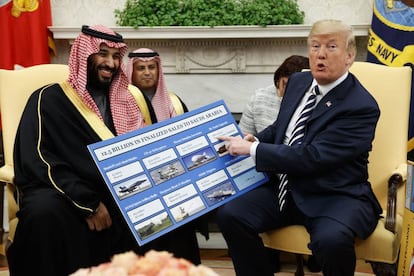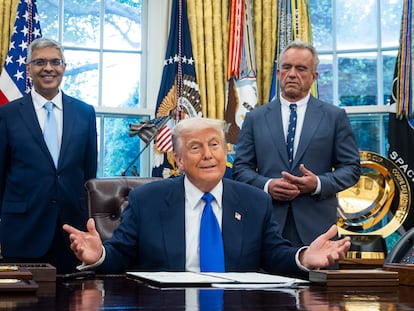Trump travels to Gulf states to seal lucrative economic deals on first tour of new term
The US president will visit Saudi Arabia, Qatar and the United Arab Emirates, but not Israel as relations are currently strained


U.S. President Donald Trump begins the first overseas trip of his second term on Monday, with planned visits to Saudi Arabia, Qatar, and the United Arab Emirates. His goal is to announce a flurry of primarily economic agreements that will allow him to show off his negotiating skills.
However, the visit comes at a volatile moment in regional geopolitics. The United States seeks to close a nuclear deal with Iran, the future of Gaza talks remains uncertain, and the recently announced agreement with Yemen’s Houthi rebels to halt attacks in the Red Sea is still surrounded by questions. On Sunday, U.S. and Iranian negotiators convened for a fourth round of talks.
For Trump, the first results have come even before takeoff. Senior U.S. officials told ABC News on Sunday that the president plans to accept what may be the most expensive foreign gift ever received by a U.S. administration: a luxury Boeing 747, gifted by the Qatari royal family, with a market value of around $400 million. The Republican intends to use the gift — which raises serious ethical concerns — as his presidential plane, Air Force One.
That Trump’s first overseas trip is to the Persian Gulf is no coincidence. Trump maintains excellent relationships with the region’s monarchies. He has elevated them to mediation in conflicts from Gaza to Ukraine. The president’s children have significant businesses and projects in the region. To the Republican, these countries are economic and strategic partners with whom he feels a stronger personal affinity than even with the traditional U.S. allies in Europe. Saudi Arabia, a major economic power, was also the first stop on his first foreign tour during his previous term in 2017, when he was newly in office.
“President Trump is going to the Gulf because it’s his favorite place,” says Jon Alterman, vice president of the CSIS think tank in Washington. “His hosts will be generous and hospitable, eager to sign deals. They will flatter him rather than criticize him… and the Gulf is a real-estate developer’s dream, with marshes and sand dunes transformed into gleaming apartment complexes, fountains, and shopping malls owned by people with government connections. In his mind, it’s the world as it should be.”

This time, unlike the first trip, Israel will not be included in Trump’s itinerary. Relations between Trump and Israeli Prime Minister Benjamin Netanyahu are currently strained. The Israeli government has not taken kindly to Washington’s agreement with the Houthis, which does not require the Yemeni rebels to halt their missile launches against Israel. Conversely, in Washington, there is unease over signs that Israel may be considering a broader invasion of the Gaza Strip.
Elliott Abrams, former deputy national security adviser to George W. Bush and now at the Council on Foreign Relations (CFR) think tank, explains: “The Israelis are concerned that the agreement with the Houthis could serve as a model for a deal with Iran, which would also leave them exposed. And of course, they’re worried about Gaza and how U.S. policy might evolve. I think there’s a degree of tension… [Israel] knows that Trump is going to spend a week in the Gulf hearing ‘Gaza, Gaza, Gaza’ every day. So this is not the best moment in U.S.-Israel relations, or for Trump-Israeli relations.”
Artificial intelligence, semiconductors, and rare earths
Trump’s first stop will be Saudi Arabia, where Crown Prince Mohammed bin Salman has already signaled his intention to invest $600 billion, with plans to expand that amount to $1 trillion. “Clearly, what [Trump] is looking to get out of all this is deals, the announcement of multiple multi-billion-dollar deals,” notes Steve Cook, a Middle East expert at the CFR. Gulf partners are interested in areas such as artificial intelligence, semiconductors, and rare earths, among others.
Saudi Arabia is also seeking an agreement with the United States to develop a civilian nuclear energy program. Under Joe Biden’s administration, this was used as leverage to encourage Riyadh to move toward normalizing relations with Israel: no normalization, no nuclear deal. But Saudi Arabia has firmly rejected any rapprochement with Netanyahu’s government while the Gaza crisis continues. Trump could signal a change in this stance on Israel during his visit.
According to U.S. media reports, Trump may also announce a symbolic but geopolitically weighty gesture during the tour: changing the official U.S. designation of the “Persian Gulf” to the “Arabian Gulf.” Such a move would align Washington with the terminology already used by many Arab countries in the region, but would likely provoke strong backlash in Iran — especially at a time when the Islamic Republic and the U.S. are trying to finalize a new nuclear agreement.
On Sunday, negotiators concluded the fourth round of talks in Oman, under the close watch of America’s Gulf allies. Unlike during Barack Obama’s presidency — when Gulf monarchies viewed any U.S.-Iran negotiations with deep suspicion — the UAE and Saudi Arabia are now cautiously supportive of these efforts. “Partly because they have more confidence in Trump. Partly because Iran’s nuclear program has accelerated quite rapidly. And they fear that military action could hit them,” says Alterman.
During Trump’s visit, the Gulf governments will try to clarify the Republican administration’s priorities in these negotiations, which have so far been sparse in detail.
“The Gulf states’ main objective will be to determine not just U.S. policy but U.S. priorities,” explains Daniel Byman, director of conflict and terrorism studies at CSIS. “There are many actors within the administration, and it’s unclear to what extent the traditional players — the National Security Council, the State Department, or the Pentagon — have influence over the policies being implemented. Not even those that directly affect them.”
Sign up for our weekly newsletter to get more English-language news coverage from EL PAÍS USA Edition
Tu suscripción se está usando en otro dispositivo
¿Quieres añadir otro usuario a tu suscripción?
Si continúas leyendo en este dispositivo, no se podrá leer en el otro.
FlechaTu suscripción se está usando en otro dispositivo y solo puedes acceder a EL PAÍS desde un dispositivo a la vez.
Si quieres compartir tu cuenta, cambia tu suscripción a la modalidad Premium, así podrás añadir otro usuario. Cada uno accederá con su propia cuenta de email, lo que os permitirá personalizar vuestra experiencia en EL PAÍS.
¿Tienes una suscripción de empresa? Accede aquí para contratar más cuentas.
En el caso de no saber quién está usando tu cuenta, te recomendamos cambiar tu contraseña aquí.
Si decides continuar compartiendo tu cuenta, este mensaje se mostrará en tu dispositivo y en el de la otra persona que está usando tu cuenta de forma indefinida, afectando a tu experiencia de lectura. Puedes consultar aquí los términos y condiciones de la suscripción digital.

